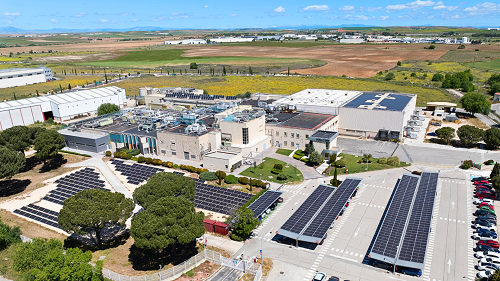Over 200 people work at Haleon's Madrid plant, which exports almost 100% of its production.
First established in 2022 as a spin-off from UK pharmaceutical company GSK, Haleon specialises in self-care products and has a broad portfolio of brands in categories like pain relief (Voltadol), oral care (Parodontax, Sensodyne and Corega) and respiratory products (Rhinomer), as well as vitamins and nutritional supplements (Multicentrum). Its purpose is to offer people better everyday health, with science-based and accessible products.
In Spain, where it employs over 400 people, Haleon has a production centre in Alcalá de Henares (Madrid) which has been operating since 1972. It has recently become the first company in the Community of Madrid to achieve the Alliance for Water Stewardship certificate, which recognises its responsible and efficient water management.

What steps has Haleon taken since its spin-off from GSK to position itself in the market?
Since the spin-off, we have focused on establishing our corporate identity as an independent company, implementing our own operational structures and appointing a new management team focused exclusively on this new phase. In our first two years, we have invested significantly in innovation, sustainability and strengthening our brands with campaigns aimed at empowering people to take care of their health.
How has this spin-off affected the Spanish subsidiary?
The spin-off was a great opportunity for Haleon Spain. It allowed us to reorganise and specialise in self-care, thereby increasing our decision-making agility and focusing on our brands. We are in addition strengthening our local capabilities in areas like the supply chain, sustainability and innovation.
How important is Spain for the company's strategy?
Spain is a strategic market for Haleon, not only because of its weight in global business, but also because of its growth potential within the self-care industry. While in some emerging markets growth is based on expanding access to health products, in countries like Spain the great opportunity lies in increasing the penetration of our product categories among the population. A clear example is tooth sensitivity: although studies indicate that around 50% of the population suffers from this, only a third of them use adequate treatment, according to a study by Ipsos. Our challenge is to close this gap through awareness, education and access to effective solutions, with a positive impact on both people's health and the sustainability of the healthcare system. In terms of market leadership, our priority is to strengthen our key categories, such as pain relief, oral health, vitamins and supplements, and respiratory care. The combination of a deep understanding of consumers and constant investment in innovation allows us to continue to offer solutions that respond to the real needs of the population. Spain does in addition play a key role within the group in terms of sustainability and production. Our plant in Alcalá de Henares is a clear example of Haleon's commitment to quality and efficiency. It will in fact be the group's first facility in Europe and the second worldwide to achieve a zero-carbon footprint, reaffirming our leadership in developing a more sustainable production model.
What infrastructure do you have in Spain?
We have our headquarters in Madrid and our production plant in Alcalá de Henares. In addition, we have logistics centres and warehouses that support both the local market and international exports. This infrastructure allows us to operate with great efficiency and to respond quickly to market needs.
How many people work at your plant in Alcalá de Henares?
Over 200 people work at our Alcalá de Henares plant. It currently has six production lines manufacturing over 50 million units of products, with almost 100% of its production destined for export. The centre specialises in respiratory products, in particular self-care solutions for flu, cold and allergies, and it serves key markets, such as the UK, Central and Eastern Europe, and the Middle East. With a cumulative investment of approximately 23.5 million euros in innovation and sustainability, this factory has become a benchmark within the company.
How many employees do you have in Spain?
In total, Haleon employs over 400 people in Spain. Our desire is to continue to grow in the coming years, especially in areas like innovation, digitalisation and sustainability, where we are strengthening our capabilities. We are committed to local talent as a key lever for growth.
What have been your most important investments in Spain?
We have made significant investments in technological modernisation, process improvement and digitalisation at our Alcalá plant. We have also committed significant resources to sustainability initiatives, such as improving energy efficiency and water management. This reinforces our commitment to operational excellence and sustainable development.
How did you decide to pursue the Alliance for Water Stewardship certificate?
The decision to pursue AWS certification was consistent with our overall sustainability strategy. Responsible water management is a priority for us and, given that Alcalá de Henares is located in a water-stressed area, we wanted to take a step forward with an internationally recognised certification. It was a demanding but very enriching process.
What does it mean for a company like Haleon to have this certificate and others that guarantee the sustainability of its facilities?
These certificates are a validation of our real commitment to sustainability. It is not just about compliance, but about leading by example. The AWS certificate, in particular, positions us as a pioneer in water management in the Community of Madrid and reinforces our credibility with consumers, institutions and strategic partners. It is another step towards achieving our aim of making everyday health more sustainable.
Photos: Haleon



